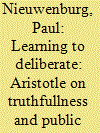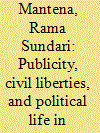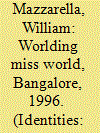| Srl | Item |
| 1 |
ID:
113273


|
|
|
|
|
| Publication |
2012.
|
| Summary/Abstract |
This article seeks to provide results from an investigation into the impact of dependent citizen journalism on the publicity of terror. In the past, many academics have identified the importance of publicity to an act of terror drawing on the concept of "propaganda by deed." This article presents results of a study into the impact of a distinct form of journalism in the digital era, dependent citizen journalism, on the publicity of terror. The argument is put forth that dependent citizen journalism generates distinctive, additional publicity to a terrorist attack. The article seeks to show how this publicity differs and what negative consequences there are to the involvement of dependent citizen journalists in the reporting process.
|
|
|
|
|
|
|
|
|
|
|
|
|
|
|
|
| 2 |
ID:
124963


|
|
|
|
|
| Publication |
2013.
|
| Summary/Abstract |
With the enactment of the Transplantation of Human Organs Act (THOA) in 1994, the Indian state sought to bring to a halt illegal organ sale and to encourage cadaver organ donation. A continuously low number of cadaveric organ donations as well as related difficulties faced by the government in banning the market lead proponents of organ sale to again argue for its legalization. Rather than examining policy discussions at the macro level, this essay argues that difficulties implementing the THOA hinge upon ways in which the option of cadaver organ donation has been 'brought to the public'. It explores ethical publicity - publicity that promotes cadaveric organ harvesting via the use of symbolic and cultural tropes - and unravels how it interacts with and addresses concerns voiced by ethical resistance; that is, resistance to cadaver organ donation that is also based upon religious or cultural resources. Consequently, this essay constructs a conversation between ethical publicity and ethical resistance, thereby questioning the relationship between rhetoric and culture, textual resources and culture as practice. This article not only reveals that the turn to organ sale might be premature, but also shows how conversations can open doors to new creative territories of embedding cadaveric organ donation in society.
|
|
|
|
|
|
|
|
|
|
|
|
|
|
|
|
| 3 |
ID:
053823


|
|
|
| 4 |
ID:
166857


|
|
|
|
|
| Summary/Abstract |
In the 1930s, there were two glaring questions confronting the princely state of Hyderabad's Administration: the question of sovereignty (or the political future of the Hyderabad) and the problem of civil liberties. This article explores the complex socio-political conditions in the early decades of the twentieth century that gave rise to the formation of dynamic civil-society institutions in the princely state of Hyderabad. In particular, it asks how and why the discourse of civil liberties was taken up by these institutions and assesses the response of the Hyderabad Administration with respect to safeguarding civil liberties for its subjects. What the historical record reveals is that the early decades of the twentieth century in Hyderabad became a battleground between the Hyderabad Administration and the burgeoning public sphere that the Administration could not control nor manage.
|
|
|
|
|
|
|
|
|
|
|
|
|
|
|
|
| 5 |
ID:
082258


|
|
|
|
|
| Publication |
2008.
|
| Summary/Abstract |
Starting with an analysis of the recent launch of EUTube, this article poses a
number of different questions about the EU's visibility, particularly from a Central and East
European perspective. Arguing against the more commonly held belief that the EU's visibility
is on the decline, the article showcases a number of alternative examples of visibility
whereby other actors, coming from the publicity world, critically engage with problems
surrounding the EU such as discrimination, the work?visa regime, the EU Constitution and
the CAP reforms. Focusing on the Polish Plumber campaign in France and Poland as well as
the Bucegi and Ursus beer campaigns in post?enlargement Romania, the article argues that
such campaigns could and should play an important role in expanding the visual horizon of
the EU and opening the door to other 'legitimate' authors of 'text' and 'images' pertaining to
the EU.
|
|
|
|
|
|
|
|
|
|
|
|
|
|
|
|
| 6 |
ID:
144169


|
|
|
|
|
| Summary/Abstract |
This essay revisits the much-discussed swarm of protests surrounding the 1996 Miss World pageant in Bangalore, India. It suggests that behind the clamour of clashing opinions regarding the content of the pageant lay a deeper crisis, uninterrogated yet constantly palpable: the absence of a performative dispensation within which the then-nascent project of liberalisation could, paradoxically, be experienced as self-grounding. By organising its discussion around interviews with some of the people most directly involved in trying to manage the meaning of the event – through sponsorship, public relations, policing, and protest – the essay shows how a reconsideration of the pageant can help us understand the delicate relation between commercial publicity and sovereign authority in a globalising age.
|
|
|
|
|
|
|
|
|
|
|
|
|
|
|
|